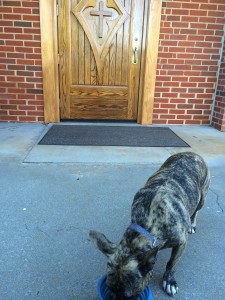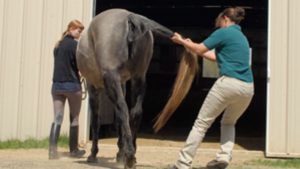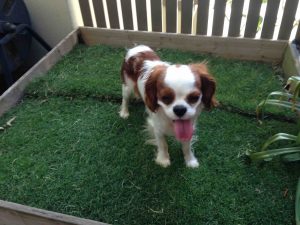Ashley Chaifetz, a PhD student studying public policy at UNC-Chapel Hill writes:
A company should be able to survive and improve in the wake of a major food recall; it’s an opportunity to reevaluate and strengthen what’s great about an operation and fix what has gone impossibly wrong.
In 2013, my dog Chloe’s (right, exactly as shown) food was recalled due to Salmonella contamination. After some struggles with refunds, we haven’t returned to feeding her any of the Natura brands foods. After trying multiple brands, we landed on the Diamond Naturals Grain Free Chicken kibble and she’s been consuming it for more than a year already. I am a fan of its ingredient list (lots of fats and proteins) and nutritional content (probiotics, omega-6 and 3, complex carbs, antioxidants), as well as its price point; Chloe seems to find it delicious.
Diamond Pet Foods had a 2012 recall due to Salmonella that resulted in 49 cases of foodborne illness in humans in 20 states due to contamination at a single production facility, discovered via a routine check. Two years later, Costco (a distributor of the Kirkland product, also recalled) settled claims for over $2M initiated by the death of Barbara Marciano’s dog, which ate the contaminated food purchased from Costco. The contaminated food had not yet been recalled. Part of the settlement included “new and improved quality control procedures and therapeutic reforms that had not been implemented prior to the recalls.”
During the investigation, the FDA observed the following: 1) All reasonable precautions are not taken to ensure that production procedures do not contribute contamination from any source. 2) Failure to provide handwashing and hand sanitizing facilities at each location in the plant where needed. 3) Failure to maintain equipment, containers and utensils used to convey, hold, and store food in a manner that protects against contamination. 4) Failure to maintain equipment so as to facilitate cleaning of the equipment.
Now, the Diamond website depicts its commitment to food safety and mentions: on-site product testing, mycotoxin control, microbial testing, water quality, air quality, and its test-and-hold program. To the average consumer (including myself), its difficult to decipher what this means and how it is different from the pre-recall era.
I called Diamond for an explanation.
The customer service person answered all my food safety questions without stumbling. She explained since the 2012 recall, they’ve made a lot of changes. Some of her descriptions remained a bit vague; others came with more detail. She said all ingredients are tested (a series of tests, she explained) and then multiple times as they are manufactured. There are on-site labs at each facility—one of the biggest changes since the recall. For each batch of food, they retain samples to test for Salmonella. Each batch must be tested and held before it is released; if it comes up as Salmonella-positive, they will not distribute it. She explained that they used to send samples out for testing, but not hold the product – so the dog food could be consumed by the time Salmonella was detected.
Additionally, there are new safety protocols in each of the plants; incoming products are segregated from final product, not just within a space, but also by room through the use of walls and dividers. The result, she told me, is less cross-contamination. I also asked about how manufacturing might have changed, if there were any major changes in how the food was processed and she said no.
It’s hard to know what any manufacturer is doing to reduce risk of contamination, it’s all about trust; I appreciate that Diamond answered the call and my questions. It’s important to me to believe that a company can learn from bad experiences and improve its operations in the face of a recall, rather than attempt to cheat the system or disagree with the recommendations. But I also pay close attention to pet product recalls (there are so many!); if there’s another recall like the one in 2012, there’s a good chance Chloe will get to try another brand.
 Product details
Product details








.jpg) reported.
reported.(1).jpg) and May 11, 2012. Ill persons range in age from less than one year old to 82 years old and the median age is 46.5 years. Sixty-eight percent of patients are female. Among the 17 patients with available information, 6 (35%) were hospitalized. No deaths have been reported.
and May 11, 2012. Ill persons range in age from less than one year old to 82 years old and the median age is 46.5 years. Sixty-eight percent of patients are female. Among the 17 patients with available information, 6 (35%) were hospitalized. No deaths have been reported.